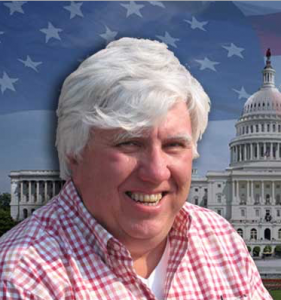WASHINGTON – Sen. Rand Paul, who has proved over the years to be as useless as a fishnet handkerchief, has recently managed to sink below his usual substrata standards by suggesting that certain initiatives he opposes and, by association, those who support those initiatives, are un-American.
Last week it was noted that Paul, R-Bowling Green, in reference to proposed legislation to strengthen security along the nation’s southern border and provide aid to Ukraine and other hot spots, which died a sad death under the direction of former president and long-term sociopath Donald J. Trump, said that it was “safe to declare this bill as anti-American.”
This week, during an interminable debate on the remnants of that failed Border-Foreign Aid package, a scissored-out measure to dispatch aid to Israel, China and Ukraine, Paul declared that sponsors of the $95.3 billion proposal were not only extending a “middle finger to America” but that the measure should be titled, “Ukraine First, America Last,” because its provisions didn’t address the southern border.
Paul, of course, opposed the border package which would have addressed those problems, but who’s keeping score, right?

At any rate, the foreign aid package survived a filibuster led by Paul, a maneuver that led Sen. John Fetterman, D-PA, to refer to him as a “prick,” a characterization shared by many in the nation’s capital. A majority of upper chamber Republicans, it should be noted, actually opposed the measure. It now goes to the House where it’s future doesn’t look particularly bright since the GOP caucus there is overwhelmingly Trumpian.
Regardless, it’s becoming clear that opposing Sen. Paul in any way is un-American, which places his fellow Kentuckian, Senate Republican Leader Mitch McConnell, on the wrong side of the divide.
McConnell supported the border bill, in fact he helped frame it, and is the top dog when it comes to supporting Ukraine. When it became obvious that the border measure, worked out with Senate Democrats, couldn’t pass, he switched gears, decided to ditch the boundary provisions and pushed the foreign aid measure, which had been his priority all along.
He’s not buying the “America First” argument.
“Helping a democratic partner defend its sovereign territory against a provoked attack from a common enemy is obviously in America’s interest,” McConnell said in a recent floor speech. “Let me stress, we aren’t defending Ukraine from aggression. The Ukrainians are doing that.”
And American businesses derive some benefit from the aid since most of the equipment Ukraine might need is manufactured in the U.S.
“I mean, quite literally, spending tens of billions of dollars here in America upgrading our capabilities, creating American manufacturing jobs, and expanding our defense industrial capacity to help us better compete with advanced adversaries,” McConnell told USA Today. “Overall, even accounting for direct assistance sent to allies like Israel, more than 75 percent of this legislation is bound for investments right here in America.”
The bill passed 70-29 but only 22 out of the 49 upper chamber Republicans voted for it, based at least to some degree on Trump’s opposition
What this vote makes clear is the rift in the Republican Party between the old guard, represented by McConnell, that seeks to maintain America’s premier status on the world stage to ward off incursions by the likes of Russia, and the America First brigade, spearheaded by Trump and Paul, who care not a fig about the international scene, concerning themselves almost entirely on the domestic front.
Should he succeed in regaining the White House come November, in fact, Trump has all-but-declared that America’s association with NATO will draw to a quick and possibly deadly close. He has already publicly declared that, should a NATO nation fail to pay its proper monetary dues to the alliance, the U.S. would not come to its defense in the event of an incursion. In fact, Trump said, he would wish a Russian invasion upon them.
So much for diplomacy.
This is the real divide in the Republican Party. While domestic issues attract most of the nation’s attention, there is actually only trivial divisions within the GOP ranks. Republicans want low taxes, no taxes really, oppose abortion, are against anything that could possibly benefit the African-American community, desire to seal the southern border and they desperately want to dismantle the regulatory machinery that keeps the country going.
They get all that with Trump. The differences on the domestic side primarily center on style, with Trump’s rhetoric, attitude, eternal nastiness and complete disregard for decency captivating a significant portion of the Republican rank-and-file while turning off the country club and Chamber of Commerce folks, who also are not all that comfortable, understandably, with a potential president who has been found to have raped a woman by a court of law. That little detail, for some reason, doesn’t seem to bother the diehards.
So, it’s on the foreign affairs side where the true intra-party battles will be waged and, as is increasingly apparent, McConnell might be holding the short stick. While McConnell and other Republicans who used to be considered the mainstream think America should retain its pre-eminent role defending democracy on the world stage, the Trumpist American Firsters believe the nation has done enough for foreign interests and should settle in at home.
“Clearly there is more objection to foreign involvement in the Senate now than there used to be,” McConnell told the Washington Post. “Usually we just had Rand Paul and (Sen.) Mike Lee (R-UT) and now I think it’s a bigger group. And in their defense they just see it differently. They don’t think America being involved around the world is a good idea. And so I respect their judgment, I just don’t agree with it.”
It appears Trump’s American Firsters are gaining ground. The Pew Research Center, in a survey released in December, found that 48 percent of Republicans and Republican-leaning independents say the U.S. is giving too much aid to Ukraine. This share is up modestly from June, when 44 percent maintained U.S. aid had gone too far.
“There are issues that come along where the views of the public at a given time may be inconsistent with what the right thing to do for the country is,” McConnell told CNN.
This rift offers an interesting subplot for Kentuckians. McConnell and Paul were considered “palsy-walsy” during their first few years together in the Senate, working full time to the benefit of the Bluegrass, they claimed. Not any longer.
While McConnell has, typically remained mum on the divorce, Paul, in that lovable, unctuous way of his, is taking regular potshots at his erstwhile buddy, going so far as to suggest that Kentucky Gov. Andy Beshear, a Democrat, could probably defeat McConnell if the 81-year-old incumbent elects to seek re-election in 2026.
Andy politely declined, explaining he prefers to remain in Frankfort.

















